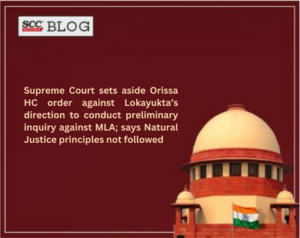Supreme Court: In the appeals challenging judgment of the Division Bench of Orissa High Court setting aside the order of Odisha Lokayukta directing the Directorate of Vigilance to conduct a preliminary inquiry under Section 20(1) of the Odisha Lokayukta Act, 2014 (‘2014 Act’) and submit a report in furtherance of a complaint indicating allegations of corruption against Pradeep Kumar Panigrahi, a Member of the Legislative Assembly (‘MLA’), the Division Bench of Ajay Rastogi* and Bela M. Trivedi, JJ. held that the High Court committed manifest error violating the principles of natural justice, and therefore, set aside the impugned judgment and order.
The instant matter relates to a complaint alleging corruption against the MLA before the Odisha Lokayukta, who initiated an inquiry by the Directorate of Vigilance in accordance with Section 20(1) of the 2014 Act. The same was challenged before the High Court through a Writ Petition under Article 226 of the Constitution wherein, order dated 3-02-2021 was passed for setting aside the Lokayukta’s directions regarding inquiry. A review petition was filed at the instance of Odisha Lokayukta for not getting the opportunity of being heard, which was also dismissed by the Court through order dated 5-04-2021 and being challenged in the instant matter.
The Court observed that the Office of Lokayukta was impleaded as one of the respondents before the High Court, but no notice was issued, and that the Division Bench of High Court proceeded with the order dated 3-02-2021 without affording an opportunity of hearing to the Lokayukta.
The Court found the need to interfere with the Division Bench’s finding that the Lokayukta entrusting the conduct of preliminary inquiry by the Directorate of Vigilance against the provisions of the 2014 Act and stayed the operation of the impugned order while issuing notice in the present matter. The Bench was informed that the Lokayukta had proceeded further with a detailed order after receiving the preliminary report and after getting the opportunity of hearing. The said order directed the Directorate of Vigilance to carry out an investigation into the matter, who submitted a detailed report of the investigation, after which no further action was initiated awaiting the orders of the Court.
The Court pointed out that authoritative action must be taken in good faith, without bias and not unreasonable or arbitrary. The Court did not appreciate the Lokayukta’s action in going further with the proceedings, but there was no valid objection on the part of the respondents, as pointed by the Court, to interfere in furtherance of the action. The Court left it to the respondent to initiate proceedings against the Lokayukta if further action is not in conformity with law.
The Bench scrutinized the Scheme of 2014 Act focusing upon the object, applicability, provisions in general and those specific to preliminary inquiry and investigation, etc. The Court reiterated the time-tested rules under the concept of natural justice as follows:
-
No one shall be a judge in his own case: Nemo debet esse judex in propria causa
-
No decision shall be given against a party without affording him a reasonable opportunity of hearing: Audi alteram partem
The Court observed that the Division Bench committed a manifest error by completely overlooking the provision under Section 20(1) of the Act, 2014 empowering the Lokayukta to proceed and hold an inquiry after receiving a complaint by either conducting a preliminary inquiry against a public servant by its inquiry wing or any other agency. The Lokayukta may ascertain if there exists a prima facie case for proceeding in the matter, or investigating through any agency, or authority empowered under any other law for investigating the existence of a prima facie case. The Court also noted that ‘any agency’ manifests from Sections 25 and 28 which may refer to any agency including the State Vigilance and Crime Branch or Directorate of Vigilance. The Court did not find any legal infirmity in the decision-making process while conducting the preliminary inquiry and held the finding of Division Bench of High Court legally unsustainable.
The Court also refused to accept the submission of bias on part of the Directorate of Vigilance cell in conducting preliminary inquiry, since the Officer who complained was simply an informant and not an interested person. Also, the preliminary inquiry was conducted by a different Officer independent of the complainant. Thus, the Court viewed that the principles of bias are not even remotely attracted to the present matter. The Court relied on Mukesh Singh v. State (NCT of Delhi), (2020) 10 SCC 120 regarding the scope of bias in an investigation conducted by the police officer himself being the complainant.
The Court held that there was no element of bias in conducting a preliminary inquiry and that the objection raised by the respondents stands overruled. Addressing the question of locus standi of the Lokayukta, the Court held that the Lokayukta’s order being interfered with and set aside by the court makes him an aggrieved party, and that the only remedy available is to question the order of the Division Bench of the High Court by filing an SLP under Article 136 of the Constitution.
The Court allowed the present appeals and set aside the High Court’s judgment and order dated 3-02-2021 and 5-04-2021.
[Odisha Lokayukta v. Pradeep Kumar Panigrahi, 2023 SCC OnLine SC 175, Decided on 23.02.2023]
*Judgment authored by: Justice Ajay Rastogi

